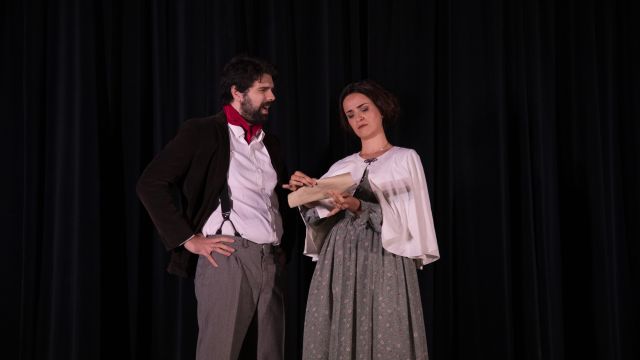Bunyip Barons
Bunyip Barons is a quintessential Australian story based on the real life of Louisa Anne Meredith (1812-1895), a writer, botanist and painter who arrived in Sydney from England in 1839 with her husband. She is writing her latest book, “Notes and Sketches of NSW” and is eager to interview as many of the locals as possible to “capture the essence of Australia”. She is soon invited to Evergreen House in Elizabeth Bay for a welcome party hosted by the fictional Coys, a wealthy aristocratic family. She learns that the class system in Australia shows troubling signs of real struggle between the convicts and free settlers, the outright greed of the owning classes and the cruelty visited upon convict servants.
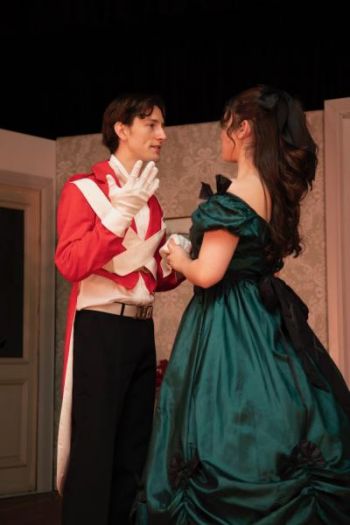 Timothy Smith has created an original and authentic Australian story from comments made by Louisa Anne Meredith as recorded by Robert Hughes in his iconic work “The Fatal Shore”. Meredith noted that Sydney’s gentry was superficial, vulgar and having no intellectual rigour at all. These words were the catalyst for Smith delving into the history of the period in an effort to better understand Meredith’s comments. Using Meredith’s own words in her book “Notes and Sketches of NSW” he has been able to build a clearer picture of Meredith’s passions, pursuits, concerns and character. Bunyip Barons is the culmination of years of research: “ I wanted to write a play that resurrects the dusty era of Australian history in a gritty, gothic yet playful way, full of Dickensian style characters, with a style that doesn’t feel like homework.” (Timothy Smith Writer and Director).
Timothy Smith has created an original and authentic Australian story from comments made by Louisa Anne Meredith as recorded by Robert Hughes in his iconic work “The Fatal Shore”. Meredith noted that Sydney’s gentry was superficial, vulgar and having no intellectual rigour at all. These words were the catalyst for Smith delving into the history of the period in an effort to better understand Meredith’s comments. Using Meredith’s own words in her book “Notes and Sketches of NSW” he has been able to build a clearer picture of Meredith’s passions, pursuits, concerns and character. Bunyip Barons is the culmination of years of research: “ I wanted to write a play that resurrects the dusty era of Australian history in a gritty, gothic yet playful way, full of Dickensian style characters, with a style that doesn’t feel like homework.” (Timothy Smith Writer and Director).
The bunyip, a legendary creature that inhabits Australia’s water holes, swamps and river beds is deeply rooted in Aboriginal folklore and colonial accounts. For the settler society the bunyip became a symbol of mystery, the unknown land and a metaphor for the oddities of Australian nature and society.
Smith learned that the “Bunyip Aristocracy” became part of the Australian vernacular in the 1800’s to describe the ambitions of the political class to establish a “colonial nobility” in NSW. The phrase endures as a critique of pretension and the idea of colonial elites.
In Smith’s play Bunyip Barons, the cast brings colonial class tensions and comedic absurdity to life with an energetic spirit and a number of standout performances.
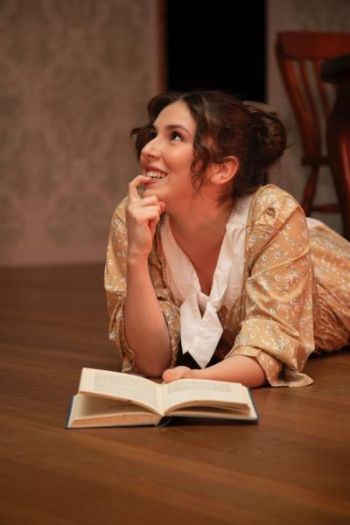
There were some truly memorable contributions in this production, led by Bernadette Hunter, who shines as the convict servant Mary Dawes. Hunter’s performance is nothing short of captivating—authentic, quietly powerful, and consistently engaging even when she is not the focus of the scene. Her attentive listening, effortless emotional truth, and warm connection to fellow characters create a beautifully grounded portrayal.
John Brown is a firm audience favourite as Silas Hegarty, the loyal convict servant to the Coy family. Brown brings both humour and tenderness to the role, turning even the smallest gestures into memorable moments. His scenes are peppered with delightful comic detail, yet he also lands the play’s more poignant notes effectively. A little more emotional build as Silas shares his past with Mary would enrich an already impressive performance.
Olivia Riddell is a breath of fresh air as Arabella Coy, the spirited nineteen-year-old daughter. Diddell’s portrayal is vibrant, ditzy, and irresistibly charming—forever in motion, brimming with romantic idealism and wonder. Her window-gazing sequences are a joy, infusing the stage with whimsy and youthful delight.
As her earnest suitor, Micah Doughty brings sincerity and heartfelt energy to Lt. Josiah Brownrigg. With forthright endeavour, he commands attention whenever he steps into the spotlight, grounding Arabella’s romantic fantasies in a genuine emotional connection.
Stephen Wheatley gives a commanding turn as Colonel George McClintock. His strong stage presence and confident delivery serve as a reminder that smaller roles, when expertly executed, can leave a lasting impact and elevate the overall tone and texture of a production.
Kristen Placko delivers a standout performance as Louisa Anne Meredith—the forthright and principled Englishwoman appalled by Australia’s harsh social hierarchies. Elegant, articulate, and magnetic, Placko commands the stage with grace and conviction. She is every inch the heroine: poised, thoughtful, and compelling from start to finish.
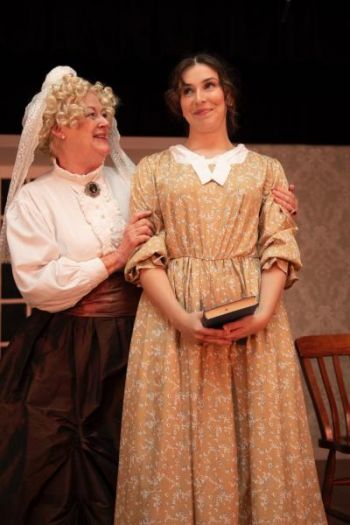
Don Ezard impresses as the implacable Everard Coy, the archetypal aristocrat obsessed with status and propriety. Ezard brings stiff-backed snobbery and comedic indignation to the role, his physicality amplifying the character’s arrogance with almost uncomfortable ease. His performance strikes a satisfying balance between satire and sincerity.
Cecilia Smith, as Minnie Coy, offers glimpses of nuance and warmth, with several lovely moments. While some lines lack full conviction and precision, there is clear potential for growth; as the run progresses, increased confidence may allow Smith to more strongly assert her character’s emotional stakes.
Timothy Winkels bursts into the story with energy and raw authenticity as the runaway convict Wallace Hopkins. His early scene with Louisa is vibrant and compelling, creating a strong foundation. In later moments, as he impersonates an upper-class cousin, more restraint would allow the character’s later drunken excesses to land with sharper comedic contrast. The potential is evident, and with fine-tuning, the arc could be even more effective.
Neilson Brown, as Louisa’s mostly absent husband, adds a subtle but meaningful layer to the narrative. His brief appearances reinforce the notion that colonial women were frequently left to manage life on their own while men pursued what they considered the “real work.” His performance offers gentle support and strengthens Louisa’s independence and resilience.
The set was simple but practical and gives a nod to colonial Australia. Some moulding on the internal door, a dado rail around the walls and a front entry door that opens inwards would have enhanced the effect. It was also noted that servants would never enter or leave through the front door so a further entrance / exit point might have been created to avoid this.
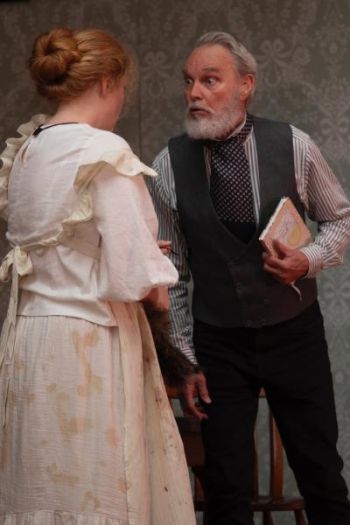 Smith’s direction was well conceived and the movement and placement of characters was thoughtful and flowed well to deliver the story line. The almost dreamlike sequence as Louisa grapples with an intrusive creature allowed her to provide her real thoughts out loud to the audience. This was a clever device to surprise the audience and provide exposition that would later explain her actions.
Smith’s direction was well conceived and the movement and placement of characters was thoughtful and flowed well to deliver the story line. The almost dreamlike sequence as Louisa grapples with an intrusive creature allowed her to provide her real thoughts out loud to the audience. This was a clever device to surprise the audience and provide exposition that would later explain her actions.
Bunyip Barons is an engaging story from Australia’s colonial past with a very well written script and some well drawn characters. Timothy Smith is to be congratulated on the culmination of his years of research and endeavour. He has created a new narrative that offers Australians a deeper understanding of their past.
The program for the show is full of interesting information about Smith’s journey and Meredith’s life and is a fitting accompaniment to understanding the foundations of this new theatrical offering.
Australian history buffs and anyone with even a passing interest in our colonial past should not miss this production.
RizzieReviews
Images: Clare T Photography
Tickets are available at https://upstageproductionssydney.my.canva.site/
Subscribe to our E-Newsletter, buy our latest print edition or find a Performing Arts book at Book Nook.

